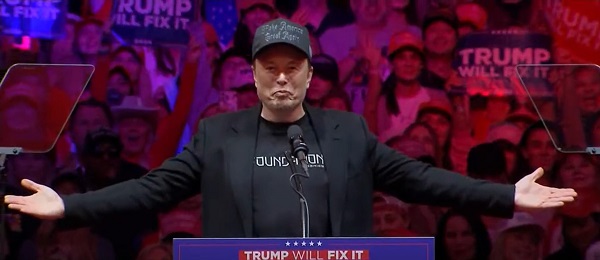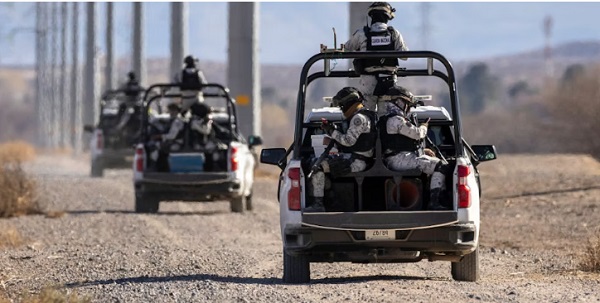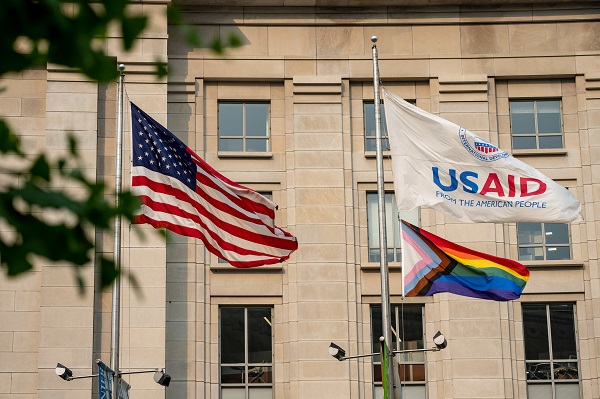illegal immigration
Court rules in favor of Texas in razor wire case

From The Center Square
By
Attorney General Ken Paxton also said the ruling was a “huge win for Texas…. We sued immediately when the federal government was observed destroying fences to let illegal aliens enter, and we’ve fought every step of the way for Texas sovereignty and security.”
A panel of three judges on the Fifth U.S. Circuit Court of Appeals ruled in favor of Texas in a lawsuit filed over its concertina wire barriers.
The court ruled 2-1 in a case that may set the tone for two other cases before the court related to Texas’ border security operations.
Circuit Judge Stuart Kyle Duncan wrote for the majority, with Judge Don Willett joining him. Judge Irma Carrillo Ramirez dissented, arguing Texas did not meet “its burden to show a waiver of sovereign immunity or a likelihood of success on the merits.”
The ruling was issued 13 months after Texas sued the Biden administration after it destroyed concertina wire barriers it erected on state land.
The court was asked to decide whether Border Patrol agents can legally cut concertina wire fencing erected by Texas law enforcement along its border with Mexico. The Biden administration ordered Gov. Greg Abbott to remove it, arguing he was interfering with federal immigration operations. Abbott refused, arguing that the administration was facilitating illegal entry and violating federal law. In response, the administration ordered Border Patrol agents to use a bulldozer and remove wire fencing. Abbott sued, arguing they were destroying Texas property and Texas has the legal authority to erect barriers on state land.
Texas requested the district court to issue an injunction to block Border Patrol agents from removing the fencing, which it denied despite agreeing with Texas’ arguments.
The court “agreed with Texas on the facts: not only was Border Patrol unhampered by the wire, but its agents had breached the wire numerous times ‘for no apparent purpose other than to allow migrants easier entrance further inland,’” the Fifth Circuit’s 75-page ruling states. However, it denied Texas’ request arguing the federal government had sovereign immunity.
Texas next appealed to the Fifth Circuit, which granted the injunction pending appeal. The Biden administration appealed to the U.S. Supreme Court, which vacated the injunction without any stated reason.
The Supreme Court’s ruling didn’t deter Texas, which continued building and erecting concertina wire in the Eagle Pass area, and later established the military base for Texas’ border security mission, Operation Lone Star, there. OLS officers also expanded concertina wire barriers in other key areas along its border.
“The Texas National Guard continues to hold the line in Eagle Pass,” Abbott said at the time. “Texas will not back down from our efforts to secure the border in Biden’s absence.”
The three-judge panel ruled that Texas “is entitled to a preliminary injunction.” The ruling states that the Biden administration “clearly waived sovereign immunity as to Texas’s state law claims under § 702 of the Administrative Procedure Act,” which it says “is supported by a flood of uncontradicted circuit precedent to which the United States has no answer.”
The Fifth Circuit also rejected other Biden administration arguments, including that Texas was erecting barriers to safeguard its own property, not to “regulate Border Patrol.”
The ruling reversed the district court’s judgment and granted Texas’ preliminary injunction. The court also prohibited the federal government from “damaging, destroying, or otherwise interfering with Texas’s c-wire fence in the vicinity of Eagle Pass,” including Shelby Park, which Abbott shut down after learning that the Biden administration was using it as a staging ground to facilitate illegal entry into the US.
Abbott lauded the Fifth Circuit ruling, saying, “The federal court of appeals just ruled that Texas has the right to build the razor wire border wall that we have constructed to deny illegal entry into our state and that Biden was wrong to cut our razor wire. We continue adding more razor wire border barrier.”
Attorney General Ken Paxton also said the ruling was a “huge win for Texas.”
“The Biden Administration has been enjoined from damaging, destroying, or otherwise interfering with Texas’s border fencing. We sued immediately when the federal government was observed destroying fences to let illegal aliens enter, and we’ve fought every step of the way for Texas sovereignty and security.”
With weeks left in the administration, the concertina wire barrier case is unlikely to be appealed for a full court review.
In May, the court is scheduled to hear arguments on a lawsuit related to Texas’ marine barriers in the Rio Grande River, unless the case is dropped by the incoming Trump administration. Another case before the court is over Texas’ border security law, SB 4.
Business
FEMA Quietly Slid $59 Million Out The Door For Illegal Migrants To Put Their Feet Up At ‘Luxury Hotels’: Musk


From the Daily Caller News Foundation
By Jason Hopkins
“That money is meant for American disaster relief and instead is being spent on high end hotels for illegals!” he continued. “A clawback demand will be made today to recoup those funds.”
The Federal Emergency Management Agency (FEMA) handed out $59 million to “luxury” hotels in New York City to house illegal migrants, Elon Musk said Monday.
Musk — who leads the Department of Government Efficiency (DOGE), a temporary agency within the Trump administration tasked with weeding out frivolous spending by the federal government — said it was his DOGE team that made the discovery. The top White House official said the payment was in violation of President Donald Trump’s executive order and efforts would be made to recover the funds.
“The @DOGE team just discovered that FEMA sent $59M LAST WEEK to luxury hotels in New York City to house illegal migrants,” Musk posted on X. “Sending this money violated the law and is in gross insubordination to the President’s executive order.”
“That money is meant for American disaster relief and instead is being spent on high end hotels for illegals!” he continued. “A clawback demand will be made today to recoup those funds.”
The details around the alleged payout are not completely clear. FEMA did not immediately respond to a request for comment from the Daily Caller News Foundation, nor did a spokesperson for DOGE.
Former White House press secretary Karine Jean-Pierre in October denied the Biden administration was using FEMA funds for migrant accommodations, but in 2022 she suggested that the agency was assisting cities with the migrant crisis.
On his first day back in office, Trump signed an executive order that placed a temporary suspension on refugee resettlement into the United States. The president additionally noted how some major cities, like New York City and Chicago, have requested federal aid to help manage the massive influx of migrants entering their jurisdictions.
The president additionally signed an executive order placing a freeze on federal grants and loans as it conducts a review of the government’s spending, but that order has since been blocked by the courts.
However, New York City officials have a long history of placing illegal migrants into four-star hotels as they’ve struggled to find accommodations for the sheer number of asylum seekers flocking to the Big Apple.
New York City began housing migrants in the four-star Collective Paper Factory hotel around August 2023 after it was reorganized into a Department of Homeless Services emergency shelter. The five-story Collective Paper Factory itself is equipped with a restaurant, a gym, a bar, meeting rooms for guests and communal spaces.
The “chic” Square Hotel was converted into housing for migrants. Other “upscale” hotels in the Big Apple have also been converted into migrant housing in the past as city officials continue to deal with the migrant crisis, including The Row, which has also been described as a “four-star hotel.”
“A 4-star hotel is considered luxury lodging,” according to Kayak, a company that provides hotel booking services. “Guest rooms are noticeably more spacious, with top-quality linens, pillowtop mattresses, bathrobes, slippers, minibars, and upscale toiletries, plus equipped kitchens.”
NYC’s Department of Homeless Services was reportedly seeking a contract with local hotels to provide roughly 14,000 rooms in order to shelter migrants through 2025. City officials anticipated spending on migrants in need of housing for the current fiscal year and the past two years combined will exceed $2.3 billion, with a significant amount of these costs going toward hotel rent.
The Big Apple — a sanctuary city jurisdiction with strict laws restricting cooperation between local law enforcement and Immigration and Customs Enforcement — has become a major destination for the massive number of illegal migrants who’ve flocked into the United States. Roughly 230,000 migrants have arrived in NYC since the spring of 2022, according to data provided by the mayor’s office.
FEMA underwent an internal investigation in November after it was uncovered that a supervisor reportedly instructed disaster relief workers deployed in the aftermath of Hurricane Milton to avoid houses with Trump signs.
illegal immigration
Will Mexico Face A Hot Shooting War With The Cartels?

From Todd Bensman for the Daily Wire
As Mexico prepares to position 10,000 troops between cartels and their drug money, odds are the lead will fly
The chosen political slogan of Mexico’s last and current president, “Abrazos, no balazos” (“Hugs, not Bullets”), is often embraced to describe official government policy toward the country’s ultra-violent drug-trafficking cartels. The beauty of this slogan is that it requires no explanation.
The reverse, however, “Bullets, not Hugs,” is probably up next whether Mexico likes it or not. President Donald Trump has just forced Mexican President Claudia Sheinbaum to capitulate to a threat of ruinous 25% trade tariffs on Mexican exports unless she uses military force to suppress the flow of fentanyl (and illegal immigrant smuggling) over the U.S. southern border. She’s deploying 10,000 troops to cartel country, right smack in the drug-trafficking lanes of Mexico’s far northern precincts along the U.S. border.
This deployment of Mexican troops, however, is quite different from previous ones, in which the main mission was to slow illegal immigration only, including during Trump’s first term and throughout the Biden term. For this one, the Trump mission demand is, as State Department Spokeswoman Tammy Bruce put it recently, that Mexico needs to “…dismantle transnational criminal organizations, halt illegal migration, and stem the flow of fentanyl and precursor chemicals from China.”
That American priority has just put Mexican forces in the crosshairs of the most sensitive cartel hotspot: the blood-soaked zone between heavily armed cartel forces and their money just across the U.S. border.

John Moore/Getty Images
As if this was not provocative enough on its own, a senior Trump official with direct knowledge told me bilateral plans call for at least some of the more trusted of Mexico’s forces to physically attack cartel-run narcotics depots that would include pre-smuggling fentanyl hubs inside Mexico.
Certain U.S. intelligence groups are working with the Mexican government “to give them an exact laydown. They say they’re going to target the narcotics. We’re literally still at the table.”
All of this should prove triggering, literally, to any of Mexico’s nine main cartels once the whole enterprise ramps up in earnest.
I have a good feel for what this set of circumstances portends. As a reporter for Hearst News in San Antonio, Texas, from 2006-2009, I regularly covered the exceptionally bloody civil drug war against the cartels that Felipe de Jesus Calderón Hinojosa (2006-2012) declared and which, after hundreds of thousands of Mexican casualties, spawned the popularly preferred “Hugs, not Bullets” policies of his successors. The U.S. partnered with Mexico throughout the war, providing targeting intelligence and billions of dollars to modernize its security forces. All of that was for a quest to stem the flow of illegal drugs into the United States.
But after six years of ferocious combat and widespread torture and assassination, Mexico retreated in almost total defeat. The drug flow may have dipped from time to time but it never stopped.
In the years since, I’ve often pondered whether Calderón and his successors should have trebled down when defeat seemed inevitable, as did former President George W. Bush during the Iraq war. When the chips were down amid calls for a humiliating U.S. withdrawal during the Iraq war, Bush famously turned the tables by deploying 30,000 more troops. With Mexico, however, disrupting fentanyl production and trafficking with the military will not be easy, and may very well spark another government-cartel war similar to 2006-2012.

John Moore/Getty Images
The stars and planets all seem to be aligning for more violence, including from an unexpected quarter: President Sheinbaum herself may be aching for this fight.
Rodrigo Nieto-Gomez, a Mexico-born and educated national security research professor for the Naval Postgraduate School in Monterey, California said Sheinbaum has installed anti-cartel Morena Party hardliners over much of Mexico’s state security apparatuses. This wing of her party, Nieto-Gomez explained, has been spoiling to shed the “Hugs, not bullets” policy for a good hard fight with the cartels.
Trump is now providing a “top-cover” excuse for them to finally exert the military pressure they’ve been wanting.
“Trump’s actions have temporarily tilted the playing field in favor of Morena,” Nieto-Gomez said. “With the right philosophy and the right level of American support, we may see a different type of violence in Mexico.”
Perhaps a worthy achievable goal for Mexican military fireworks is that it forces a sort of devil’s truce where the cartels, whose leaders are the most consummate and pragmatic of capitalists, ultimately agree to voluntarily quit fentanyl altogether as a good business decision — if the other drugs are allowed to roll in as usual. After all, when the operatives are shooting and dying, they’re spending rather than earning.
What seems certain, however, is that Trump’s inevitable following through on his campaign promises to suppress fentanyl ups the chances of a conflict between the Mexican military and the cartels. No doubt the cartels are now feeling uncharacteristically pinched these days on many other fronts thanks to Trump’s return.

John Moore/Getty Images
Trump has asked his Secretary of State to designate them as foreign terrorist organizations, which would open authorities for America and its allies to seize assets and prosecute banks and people who work with the cartels on serious “material support” crimes. To isolate and weaken them where it counts, in the pocketbook, and disrupt their global operations.
And, of course, Trump has all but killed the biggest cash cow those cartels have seen in years by shuttering the southern border almost hermetically in a matter of days. Their smugglers are moving probably fewer than 500 illegal immigrants a day now, most of them caught and deported right away, compared to 14,000 a day last December. Those numbers are a catastrophe and should drive the cartels to invest everything they have in drug trafficking again.
Because they are now free from babysitting and processing illegal migrants all day long, Border Patrol is back on the drug traffickers full force and they have help, the U.S. military is down there glassing the landscape and using surveillance assets to spot the traffickers.
Some of the cartels were already so frustrated their leaders approved the use of drones to attack U.S. agents standing in the way of drug loads. Cases of firearms attacks on Border Patrol are rising.
Now Mexico’s going to put 10,000 troops in between them and their money?
If she is not already, Sheinbaum should be preparing for the worst right about now. President Trump absolutely expects some kind of real action — with demonstrable results — or else he’ll push that tariff button. She’s under pressure right now to produce something, anything, whether for show or not. And the cartels are ever ready to go to war.
Thanks to former President Joe Biden’s mass migration program, it could very well happen, because now the impulsive, brazen, money-hungry cartels are are extremely well-armed from the billions they all earned over the past four years.

John Moore/Getty Images
Sheinbaum undoubtedly discerns the dangers here and will have to tread carefully between appeasing Trump and sparking another all-out civil war, which many in the United States believe is long overdue. And maybe it is. She and all the cartel leaders would probably feel lucky to cap things down to merely a “splendid little war” like the 1898 Spanish-American war.
But President Trump knows the art of the deal often pivots on what’s good business for everyone involved.
Mexico’s 2006-2012 war shows the cartels will more than likely survive whatever fireworks are coming, if any. Trump may make them realize sooner rather than later that they just have to give up the fentanyl.
* * *
Todd Bensman is a Senior National Security Fellow at the Center for Immigration Studies and a two-time National Press Club award winner. He is a graduate of the University of Missouri School of Journalism and a 23-year veteran newspaper reporter. He is the author of “America’s Covert Border War,” and “Overrun: How Joe Biden Unleashed the Greatest Border Crisis in U.S. History.”
-

 Business2 days ago
Business2 days ago‘The DNA Of Our Foreign Policy’: How USAID Hid Behind Humanitarianism To Export Radical Left-Wing Priorities Abroad
-

 Energy2 days ago
Energy2 days agoLATE TO THE PARTY: Liberal Resource Minister Minister Suddenly Discovers Canada Needs East-West Pipeline
-

 Business18 hours ago
Business18 hours agoFEMA Quietly Slid $59 Million Out The Door For Illegal Migrants To Put Their Feet Up At ‘Luxury Hotels’: Musk
-

 Business11 hours ago
Business11 hours agoMusk Quietly Inserts DOGE Across Federal Agencies In Move That Could Uproot $162,000,000,000 Govt Industry
-

 International1 day ago
International1 day agoDonald Trump reaffirms intention to buy Gaza and annex Canada
-

 Business1 day ago
Business1 day agoCanadians continue to experience long waits for MRIs and CT scans
-

 COVID-1920 hours ago
COVID-1920 hours agoMedia failing to cover ‘powerful testimony’ of people injured by COVID vaccines
-

 International20 hours ago
International20 hours agoShocking images appear to show FBI agent with gun drawn raiding bedroom of J6 protester’s baby




